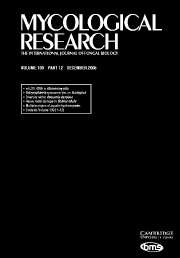Crossref Citations
This article has been cited by the following publications. This list is generated based on data provided by
Crossref.
Frazer, Lilyann Novak
1998.
One stop mycology.
Mycological Research,
Vol. 102,
Issue. 12,
p.
1571.
Rao, J. Praveen
and
Subramanyam, C.
1999.
Requirement of Ca2+for aflatoxin production: inhibitory effect of Ca2+channel blockers on aflatoxin production byAspergillus parasiticusNRRL 2999.
Letters in Applied Microbiology,
Vol. 28,
Issue. 1,
p.
85.
Jayashree, T.
Praveen Rao, J.
and
Subramanyam, C.
2000.
Regulation of aflatoxin production by Ca2+/calmodulin-dependent protein phosphorylation and dephosphorylation.
FEMS Microbiology Letters,
Vol. 183,
Issue. 2,
p.
215.
Juvvadi, Praveen Rao
Arioka, Manabu
Nakajima, Harushi
and
Kitamoto, Katsuhiko
2001.
Cloning and sequence analysis ofcnaAgene encoding the catalytic subunit of calcineurin fromAspergillus oryzae.
FEMS Microbiology Letters,
Vol. 204,
Issue. 1,
p.
169.
Sacadura, Nuno T.
and
Saville, Barry J.
2003.
Gene expression and EST analyses of Ustilago maydis germinating teliospores.
Fungal Genetics and Biology,
Vol. 40,
Issue. 1,
p.
47.
Juvvadi, Praveen Rao
Kuroki, Yutaka
Arioka, Manabu
Nakajima, Harushi
and
Kitamoto, Katsuhiko
2003.
Functional analysis of the calcineurin-encoding gene cnaA from Aspergillus oryzae: evidence for its putative role in stress adaptation.
Archives of Microbiology,
Vol. 179,
Issue. 6,
p.
416.
Juvvadi, Praveen Rao
and
Chivukula, Subramanyam
2006.
Putative Calmodulin-Binding Domains in Aflatoxin Biosynthesis–Regulatory Proteins.
Current Microbiology,
Vol. 52,
Issue. 6,
p.
493.
Nguyen, Quoc Bao
Kadotani, Naoki
Kasahara, Seiji
Tosa, Yukio
Mayama, Shigeyuki
and
Nakayashiki, Hitoshi
2008.
Systematic functional analysis of calcium‐signalling proteins in the genome of the rice‐blast fungus,Magnaporthe oryzae, using a high‐throughput RNA‐silencing system.
Molecular Microbiology,
Vol. 68,
Issue. 6,
p.
1348.
Meng, Shaowu
Torto-Alalibo, Trudy
Chibucos, Marcus C
Tyler, Brett M
and
Dean, Ralph A
2009.
Common processes in pathogenesis by fungal and oomycete plant pathogens, described with Gene Ontology terms.
BMC Microbiology,
Vol. 9,
Issue. S1,
Kozlova, O. V.
Egorov, S. Yu.
and
Kupriyanova-Ashina, F. G.
2010.
The relationship between cellular and calcium responses of Aspergillus awamori to external influences.
Microbiology,
Vol. 79,
Issue. 3,
p.
294.
Naveena Lavanya Latha, J.
and
Maruthi Mohan, P.
2011.
Role of cell wall bound calcium in Neurospora crassa.
Microbiological Research,
Vol. 166,
Issue. 5,
p.
419.
Hamam, Ahmed
and
Lew, Roger R.
2012.
Electrical Phenotypes of Calcium Transport Mutant Strains of a Filamentous Fungus, Neurospora crassa.
Eukaryotic Cell,
Vol. 11,
Issue. 5,
p.
694.
Wang, Zheng
Miguel-Rojas, Cristina
Lopez-Giraldez, Francesc
Yarden, Oded
Trail, Frances
Townsend, Jeffrey P.
and
Taylor, John W.
2019.
Metabolism and Development during Conidial Germination in Response to a Carbon-Nitrogen-Rich Synthetic or a Natural Source of Nutrition in
Neurospora crassa
.
mBio,
Vol. 10,
Issue. 2,
Manju Devi, S.
Raj, Navya
and
Sashidhar, R.B.
2021.
Efficacy of short-synthetic antifungal peptides on pathogenic Aspergillus flavus.
Pesticide Biochemistry and Physiology,
Vol. 174,
Issue. ,
p.
104810.




